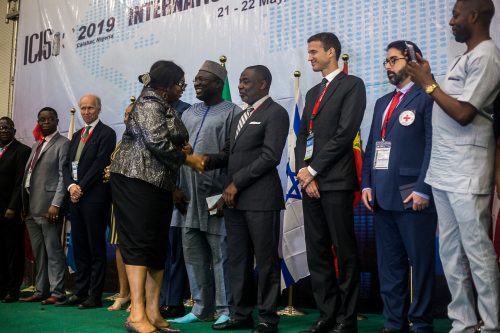
MADE Niger Delta, Others stimulate CBN, Boi to Mull Financing Window For Edo Creative Hub
May 27, 2019
Goodwill message by PIND Foundation at the International Collaboration & Investors Summit 2019
May 27, 2019
By Teslim Giwa
Electricity as a recipe for sustainable growth
The provision of electricity and affordable energy has been a major challenge to communities in the Niger Delta for as far back as the earliest improvement of natural resources within the region.
An analysis of the International Energy Agency’s 2014 Energy Indicators statistics for Nigeria, as well as the World Bank ESMAP commissioned a study on mini-grids in Nigeria in 2017 suggests that around 60–70 percent of rural communities in the Niger Delta were without access to energy.
Addressing this gap through modern and affordable off-grid solutions – capable of targeting not only basic energy needs (i.e. lighting and cooking energy) but also productive uses of energy at both household and rural enterprise levels – is a significant challenge.
The large swathes of agrarian and fishing communities will benefit from energy for development through direct value addition afforded by electricity-dependent technologies for processing, refrigeration, and preservation of their products. At the same time, newer service industries will likely emerge – economic activities like sewing, e-money services, and communal TV centers become alternative venture areas to support community living and quality of life.
However, expectations for an early connection to the national grid is near hopeless as this is even more complex considering that many parts of the Niger Delta are an archipelago of communities, nested in swamps and only reachable through waterways.
The deployment of Solar PV technologies is a rarity for the over 55 coastal Ilaje communities in Ondo State. Like many other such rural parts of the Niger Delta, PV modules and arrays have become the usual suspect within these parts of the region, especially with lots of failed solar-powered interventions such as solar street lights and solar-powered water pumps based on CSR and government social projects. Due to the political economy of these regions, many of the electrification interventions have been misdirected and have often failed to support that essential aspect of economic productivity and even welfare. Nonetheless, solar energy remains one of the most efficient and perhaps the only hope for driving energy access for many off-grid communities.
It is paradoxical that there is a relatively high economic activity, latent demand, and ability to pay for electricity in rural areas because of the populations, yet electricity generation and distribution remain problems around these parts.
The challenge should certainly present a clear market opportunity for off-grid energy providers owing to the demand for electricity for production by many of the rural enterprises across this stretch of communities, where residents have had to rely on self-generation as power sources to support their livelihoods.
Whilst the government may have opened up the energy markets through enabling policy, timely intervention is critical to the economic development, poverty reduction, wellbeing, quality of life and strategic developmental needs of these populations.
Robust measures are therefore required to achieve these goals and one of the methods to realize unfettered access to energy for development in the Niger Delta is theorized to be through the introduction of district energy solutions based on solar energy cabins.
An Energy cabin is an assembly of PV panels, batteries and control systems on a 20ft cabin or an enclosure that easily becomes an electricity plant that stands alone, off-grid with access points for electricity purchase and distribution.
The generated electricity is supplied to clients in a cluster, thereby eliminating the extensive costs of establishing a distribution network.
Through a combination of energy storage, flexibility, and modularity, the energy cabin becomes an enabling technology.
Based on the fact that electricity sources and loads can be grouped and function as economic demands dictate, they are an efficient and resilient energy option that uses a localized energy carrier to supply and serve local demand.
The Gbagira example
Gbagira is a community located along the stretch of coastal settlements bestriding the Apostle Canal in Ilaje Local Government Area of Ondo State that fits the typical profile of an off-grid coastal community. Like many other ‘last mile’ communities, Gbagira was unserved with electricity until the Foundation for Partnership Initiatives in the Niger Delta, PIND Foundation facilitated a collaborative effort between the community and A4&T Power Solutions Limited to promote private sector investment in powering the community.
Through earlier scoping studies, assessments and community engagements, PIND had established that energy access sits within the aspirations of many unserved coastal communities in terms of both economic development and welfare needs.
This was done to establish a best fit for the pilot phase based on criteria such as: interest from the community leadership in collaborating; a demonstrated understanding of the private sector-led business model; willingness to support a time-based project delivery; and willingness to support scale-up of the model through investment of community resources in the future.
PIND Foundation facilitated the signing of a power purchase deal between the leadership and people of Gbagira community and A4&T Power Solutions Limited for an initial period of one year. The signed agreement ensures that the business is able to deploy resources to this community without any fear of competition from similar providers.
The first phase of the project is a pilot 15kW solar power plant, deployed as a community hub to retail commercial electricity to a total of 26 entities comprising 16 Micro, Small and Medium Enterprises (MSMEs) such as refrigeration services, business centers, retails kiosks, fish smoking kitchens, and a petrol station; 1 private health care centre; and 9 households around the cluster. Complimentary electrical access points are also available on the energy cabin to encourage enterprise.
The energy cabin has unique advantages, as the generated electricity is supplied to clients in a cluster. This eliminates the extensive costs of establishing a distribution network. The business service is also located within the hub to manage electricity sales and provide smaller solar technology installation services on-demand to other clients such as charging of phones and sales of micro-solar products.
The project inception was in December 2018, and by April 2019 it became fully operational within the community hub, where a combination of Micro, Small and Medium Enterprises (MSMEs) that ordinarily weren’t connected or relied on petrol generators now enjoy unfettered access. The aggregated electricity demand for this pilot is 15kWh.
Due to the enormity of development challenges in the Niger Delta, the overarching strategy at the PIND Foundation is to work with a diverse collection of partners, including bilateral and multilateral aid agencies, Federal and state government agencies, private companies and civil society organizations to take advantage of combining resources, capabilities and technical expertise with diverse partners for greater collective impact.
This is exactly what the pilot energy cabin at Gbagira represents and PIND will continue to foster partnerships to drive development in the Niger Delta region and engender peace. It will specifically aim to increase the implementation of its programs in the coastal communities to spread the benefits more equitably and push for replication of successful development models such as the energy cabin model.
Chevron-powered development body inaugurates 241 million naira projects in 8 Bayelsa oil communities
Through this pilot, there is a demonstration of the transformative capability of seemingly everyday technology to challenge drudgery and poverty within a Niger Delta coastal community. It will also validate the profitability and viability of the business model as a perfect fit for the multitude of communities with a similar profile to Gbagira while encouraging investors to immediately scale-up to other communities.
For PIND Foundation, this is a key economic development program that grows businesses, boosts productivity and income for smallholder farmers and MSMEs. It will also enable integrated peace and economic growth as more coastal communities buy into the off-grid power supply approach to getting electricity.
The success of the model is envisaged to accelerate the market uptake of energy cabin based micro and mini-grids as an ‘energy for development’ solution that can always be deployed as a decentralized energy solution for off-grid communities. The Niger Delta is dotted with many such off the grid rural market/settlements.
This model perhaps may have handed energy project developers the template for a quick, efficient and sustainable business venture.
______________
Teslim is a certificated Energy Efficiency and Renewables expert under the European Energy Centre (EEC) Galileo project and also part of a growing collective of professionals working towards promoting environmental sustainability in Nigeria. He currently works as the Appropriate Technology Enabled Development Manager at PIND Foundation.









